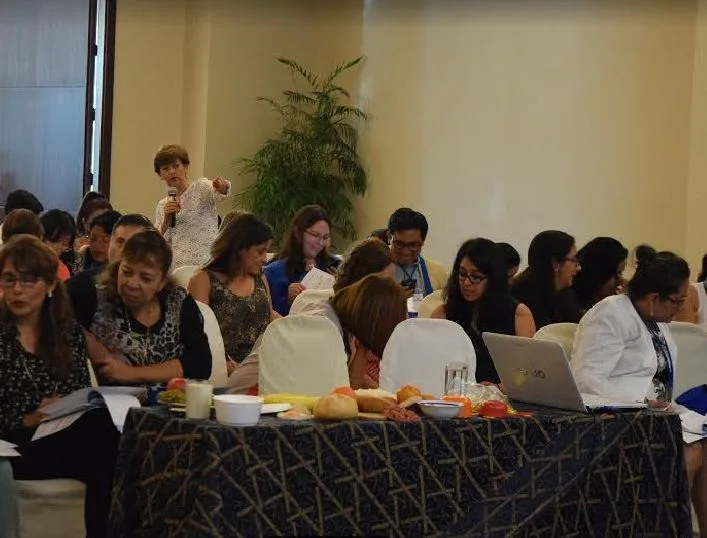Diabetes poses growing threat to Ecuador, Latin America and the higher-income countries too
Editor’s note: This article is co-authored by Dr. Rosa María Aguilar, a Mexican researcher, teacher, and expert on diabetes, and Ana Fernanda Sánchez, diabetes educator and clinical psychologist, and founder of the Los Fresnos Foundation, a non-profit social organization created by agreement of the Ecuadorian Ministry of Social Welfare in June 2002. Both attended the 3rd International Congress of Education in Diabetes in June in Guayaquil.
By Dr. Rosa María Aguilar and Ana Fernanda Sánchez
According to forecasts by the World Health Organization (ONG), diabetes will be the seventh cause of death by 2030. This situation poses a great threat, not only for Ecuador but for all of Latin America and even for high-income countries, where the disease is seen with great concern but at the same time prevention, treatment and control actions have not been effective.

Workshop at Congress of Education in Diabetes.
At present, and despite the vast existence of information, many people are still asking: “Can diabetes be treated? In fact, diabetes can be treated and controlled to prevent complications. There are key factors such as timely diagnosis, education, and becoming empowered to better manage the disease, as well as the affordable treatment that are key components of the response.
Efforts to prevent and treat diabetes are important in achieving the goal of the sustainable development objective (Millennium Development Goals ONG), which is to reduce premature mortality from non-communicable diseases by at least one-third by 2030. In this sense, society has a strategic role to play, including the government, the private sector, the educational area as well as civil society and with a great impact, the media.
Diabetes management means finding the right opportunity to return to good eating habits, physical and family integration. It should be noted that the lack of adherence to treatment, the absence of a support network and misinformation can lead to the development of serious complications. Comprehensive care is based on the following elements: medical care, nutritional counseling, physical activity plan, family support and being part of a learning process called diabetes education.
But what is diabetes education? Precisely that was the topic of discussion at the 3rd International Congress of Education in Diabetes, organized by the Casa de la Diabetes Foundation; and that as part of the events to commemorate the 15 years of its foundation, took place in the city of Guayaquil, last June. The meeting was attended by experts from Spain, Mexico, Venezuela, Colombia, Costa Rica and Ecuador, who agree on the need to provide not only medical accompaniment to the patient but also an educational one, which allows them to look at diabetes as an opportunity for growth and empowerment.

There are many ways to control diabetes.
Dr. Rosa María Aguilar, a Mexican researcher, teacher, and expert on diabetes, says that it is necessary to deepen the knowledge of the educator in diabetes, a specialty that does not exist in many countries of the world, but can be taken over by health professionals. These professional provide more than just medical care — the commitment is also to form and become educators in diabetes with the vision of providing the opportunity for a healthy life to the community at risk and diabetes. The mission is crystallized through structured educational interventions adapted to the needs of each person, with respect to their individual beliefs and preferences.
“With a clear, simple and sincere language we can reach our patients, it is necessary to take advantage of those spaces offered by the media, communities, and neighborhoods to socialize information and continue to educate about diabetes, so we could boost efforts and save many lives through these spaces,” emphasized Aguilar.
Who educates in diabetes?
For Ana Fernanda Sánchez (Ecuador), a diabetes educator / clinical psychologist and Adriana Gómez (Colombia), a nutrition expert, a diabetes educator has knowledge about the teaching-learning process and is responsible for demonstrating the impact of education on the lifestyle generating behavioral changes for a better self-care.
Sánchez explained that individualized education is necessary from the first consultation, during control and follow-up. It is a dynamic process where a varied delivery of knowledge is offered, and there is a therapeutic relationship with the educator in an interactive and negotiating way. Individualized education protects the patient’s privacy, seeks to generate empathy and thus gain their confidence to obtain better adherence to treatment.
Regarding group therapies, Gómez emphasized that this type of educational sessions should be raised in small groups. These activities may include families and/or patient support networks, the advantages lie in providing knowledge and experiences of other patients. It is not always possible to approve the type of patients who attend this activity, but the educator must create a climate of acceptance so that they can express themselves freely.
Adriana Herrera (Costa Rica), who is a dietician and educator in diabetes, said that diabetes education is an ongoing process since each program must consider that the needs of patients are changing and renewed according to the needs of each individual. It is recommended to carry out a planned evaluation, which will evaluate aspects such as biomedical parameters improvement (HbA1c, blood pressure values, among others), as well as psychosocial aspects such as quality of life, well-being, and self-care. It is very important to make positive reinforcements against the achievements and improvements of previously set objectives.
Ana Gladis Arauz (Costa Rica) and Adriana Herrera (Costa Rica) for nutrition and diabetes experts, food is a fundamental pillar for the prevention and treatment of diabetes, and knowledge in this area is continually changing, not just recommendations Nutritional; but also in teaching methodologies.
The registration of education activities allows documenting the progress of the educational process of each patient. In addition, it allows evaluating the obstacles that have been presented in the fulfillment of the objectives in each patient. It must be available to the entire health team to be able to assess the achievement of each of the areas of intervention.
A true education about feeding the patient with diabetes is the key to the progress of their treatment. Carbohydrate counting, glucose monitoring, among others are necessary to lead a healthy diet, without unnecessary deprivation or excess for lack of knowledge.
In conclusion, it is necessary not to look at diabetes as a synonym for death, amputation, blindness or abandonment, let us look at diabetes as that opportunity to rethink a new way of life where together we can move forward accompanying our patients not only with scientific knowledge but with our time, effort, and commitment and give back that confidence that they place in us, let us continue leaving legacies worthy of being remembered. Diabetes, an opportunity to walk together!
Los Fresnos Foundation and Casa del la Diabetes was founded by the diabetes educator and clinical psychologist Ana Fernanda Sánchez Encalada, whose daughter, Ana Daniela, was diagnosed as a child with type 1 diabetes. At the time, Cuenca offered few resources for the treatment, control, and management of newly diagnosed children. The foundation is based on the knowledge that education in self-management of diabetes is critical to long term health.
Over the past 15 years, Casa de la Diabetes in Cuenca has served as a center for education, treatment, resources, and support for people of all ages affected by diabetes, including type 1, type 2, and gestational diabetes. It also serves to educate and support patient’s families and caregivers.
To learn more about Casa de la Diabetes and the services provided, including diabetes supplies, doctor visits, laboratory testing, and educational events, please visit their website or their Facebook page.
Save the Date!
On Thursday, September 21 at 2:30 PM, Registered Dietitian and Certified Diabetes Educator Susan Burke March will present an hour-long presentation (with 30 minutes for questions and answers) titled, “Busting Diabetes Myths! What You Need To Know Now.” This free presentation at Casa de la Diabetes is open to all and will be in English and in Spanish. Whether you have diabetes, or may be at risk, or have a friend or family member with type 1 or type 2 diabetes, come and enjoy this informative presentation. Please RSVP to susanthedietitian@gmail.com
Address:Padre Julio Matovelle y Lorenzo Piedra (detrás de la Escuela Panamá), Cuenca
Website: http://casadeladiabetes.org.ec/#intro
Facebook: https://www.facebook.com/CasaDeDiabetes/
Telephone: (07) 288-9045
___________________
Sources:
http://www.who.int/campaigns/world-health-day/2016/event/es/
http://www.fundaciondiabetes.org/general/articulo/206/dia-mundial-de-la-diabetes-2017-mujeres-y-diabetes
http://www.fundaciondiabetes.org/educadores/educador/autenticar?url=www.fundaciondiabetes.org/educadores





















